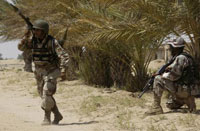British troops pull out from Iraq's second largest city of Basra
British tanks and troops pulled out from a downtown Basra base Monday leaving Iraq's second-largest city without multinational forces. It became the first move of the kind since the beginning of the US-led invasion in Iraq in 2003.

British officials said that the - built on the grounds of Saddam Hussein's elaborate palace complex - had been a center for insurgent attacks with mortar and rocket attacks that occured every day. Iraqi commanders say that the attacks will probably cease after the pull-out.
"The British troops have pulled out from the presidential palaces," said Lt. Gen. Mohan al-Fireji, the top Iraqi commander in the area. "We told those (militias) who were fighting the British troops that the Iraqi forces are now in the palaces."
Maj. Mike Schearer, a spokesman for British forces in Basra, refused to provide specific details on the pullout for security reasons, but indicated Monday that the move was not yet completed.
"We do not comment on future or ongoing operations, and we're very much involved in an operation at the moment," he said in a telephone interview.
Following the U.S.-led invasion in 2003, Britain controlled security across southern Iraq, but has since handed over three of four provinces to Iraqi forces. Britain's Ministry of Defense has previously said it hopes to hand security responsibility for Basra, the last remaining province, over to Iraqi forces sometime this autumn.
Prime Minister Gordon Brown has consistently refused to set a timetable for the overall withdrawal of British troops from the country, but the long anticipated pullout from the downtown palace will give the British government the option to pull out more than 500 soldiers immediately.
Ex-leader Tony Blair's decision to cut troops numbers in Iraq from 7,000 to 5,500 in February included an option of pulling out the soldiers based in the Basra palace once it was handed back to the Iraqis.
People on the streets of Basra on Monday cheered the departure of the British.
"We reject any strangers and they are colonialists," resident Rudha Muter told Associated Press Television News. "We are pleased that the Iraqi army are now taking over the situation - we as an Iraqi people reject occupation, we reject colonialism - we want our freedom."
Khazaal al-Nisiri said he was confident the Iraqi army would be able to provide enough security without the British presence.
"We have recently seen intensive deployment for Iraqi security troops - this indicates that the Iraqi troops are in full control of the situation," he told APTN. "So the British troops pullout won't cause a vacuum in the area - our security troops are carrying out their duty well."
U.S. officials have raised concerns about the prospect of British troops leaving the city, which has seen rival armed militia groups battle for control since the fall of Saddam.
The city sits on a key land supply line from Kuwait to Baghdad and farther north, and is also near important oil fields.
Britain's Defense Ministry said in a statement that U.S. officials had been consulted over the plan, and offered assurances that there was still a large enough British presence in the area to provide security.
"The decision is an Iraqi-led initiative and is part of a coalition-endorsed process," the ministry said.
British forces will operate from Basra Air Station, but "retain security responsibility for Basra until we hand over to provincial Iraqi control, which we anticipate in the autumn," the statement said.
Elsewhere in Iraq, a car bomb exploded at a police checkpoint outside Ramadi early Monday, killing two policemen and seriously injuring four others, as well as two civilians, said Ramadi police Lt. Col. Jubair Rashid Naif. The bridge, on a road that links Baghdad with Jordan and Syria, was unaffected by the blast, Naif said.
A car bomb targeting an Iraqi convoy in central Baghdad missed its mark, instead wounding two passing women - a medical student and a high-school teacher - police said. The victims were taken to a nearby hospital for treatment.
Subscribe to Pravda.Ru Telegram channel, Facebook, RSS!


